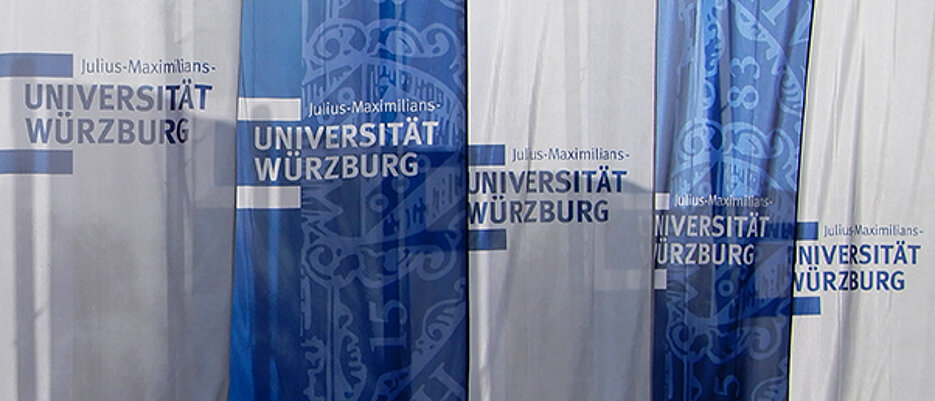Three new programmes for the structured training of doctoral students are being launched in biology, chemistry and physics. The European Union is funding them with around eleven million euros.
As part of its Marie Skłodowska-Curie Actions (MSCA), the European Union is also funding programmes for the structured training of doctoral students. The aim of these doctoral networks is to bring together universities and other research institutions, companies and stakeholders from other sectors in Europe and beyond. The aim of the joint research projects is to provide young scientists with high-quality training. Mobility, i.e. the reciprocal exchange of doctoral students, plays a major role in this.
Three scientists from Julius-Maximilians-Universität (JMU) Würzburg have successfully contributed to the application for such networks: Dr Fabian Hartmann from the Chair of Technical Physics, Professor Roland Mitric, Head of the Chair of Theoretical Chemistry, and Professor Christian Wegener from the Chair of Neurobiology and Genetics.
The EU is supporting the three networks with around eleven million euros, of which around 850,000 euros are earmarked for funding doctoral students at JMU.
Physics: Spectroscopy for Analysing Proteins
Dr Fabian Hartmann from the Chair of Technical Physics is in charge of the project. The doctoral students in the PROTEMIC network are working on integrated spectroscopy for protein analysis using metasurfaces and interband/quantum cascade devices. This type of spectroscopy is particularly valuable for protein research because, among other things, it is fast, highly sensitive and highly selective. This makes it possible to analyse protein dynamics and interactions in cells and other complex biological systems.
Integrated spectroscopy for proteins requires special laser light sources, so-called interband cascade lasers, which emit in the mid-infrared spectral range. These lasers are being developed at the Chair of Technical Physics. They are based on complex sequences of thin layers of different materials and material compositions, which have to be produced with the utmost precision. PROTEMIC is focussing on the energy efficiency of the laser sources and the tunability of their emission wavelength.
A total of eight partners from four European countries (Ireland, Germany, Austria, Spain) are involved in the project. It is expected to start in October 2024 and run for five years. The funding amounts to around 4.1 million euros, of which 326,000 euros will go to JMU.
Chemistry: Spectroscopy of Light-driven Reactions
Using molecules that can be switched on and off by light, researchers could, for example, track the communication pathways between nerve cells or design drugs that are specifically activated at their sites of action. The LUMIERE network ("Liquid phase Ultrafast photoeMIssion spEctroscopy of nonadiabatic photoREactions in biomimetic systems") is working on the foundations for such applications. Professor Roland Mitric from the JMU Institute of Physical and Theoretical Chemistry co-initiated it.
The network scrutinises the chromophores of light-sensitive proteins. Chromophores ("colour carriers") are those groups of atoms that absorb light and then change their shape, thereby triggering a reaction in their environment. The question is how this mechanism works in detail and how it can be controlled. In order to understand this, the researchers are designing and synthesising new types of chromophores and then analysing them using photoelectron spectroscopy. They hope to be able to control the functions of light-sensitive proteins and develop new applications.
In addition to JMU, universities from France, Italy, the UK and the Czech Republic are involved in the network, as are institutes from the Max Planck Society, the Helmholtz Association and the Leibniz Association, as well as several industrial partners. The funding amounts to around 2.7 million euros, of which 261,000 euros will go to JMU.
Biology: The Endogenous Clock of Insects
The endogenous clock of insects is the focus of the doctoral network in which neurogenetics professor Christian Wegener from the Chair of Neurobiology and Genetics at the JMU Biocentre is involved (INsect Clock Initial Training Experience, INCITE). The funding amounts to around four million euros, of which around 261,000 euros will go to the University of Würzburg.
Twelve leading European research groups are working together in the network to investigate the endogenous clock of insects from different angles using a comparative and applied approach. Their aim is to gain a better understanding of the circadian biology of insects to identify ways of improving the economic performance of the animals in agriculture.
The network is supported by international industrial partners who mass breed insects as a food component or as crop pollinators. At the JMU Biocenter, a doctoral student will specifically investigate the influence of growth-regulating neuroendocrine signalling pathways in interaction with day length on the developmental duration and body weight of flies. The project will start in September 2024 and run for four years.







